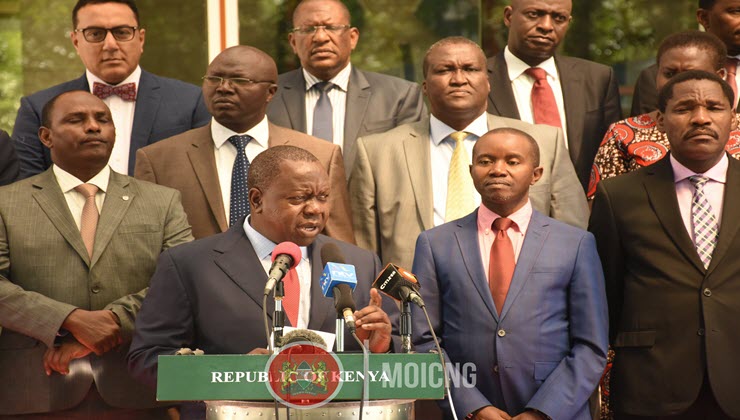Matiang’i sets condition for cash transfer to counties

The national government on Wednesday set tough conditions for the disbursement of funds to counties.
According to a tweet published by the Interior ministry, cash transfers to the counties shall now be based on payment of pending bills by counties.
“Non-payment of pending bills by counties has hurt the operations of suppliers & contractors, including SMEs[ small and medium enterprises]. Henceforth, disbursement of funds to the devolved units shall be based on the progress made in settling pending bills as verified and confirmed by the Auditor-General,” said the tweet published by the Interior ministry.
Interior CS Fred Matiang’i issued the directive outside Harambee House after chairing the National Development Implementation and Communication Committee.
Dr Matiang’i said the national government will clear their pending bills within the next one month but directed counties to pay their bills because they have already received their cash.
“The government will use any lawful means to ensure that governors pay the pending bills,” said Dr Matiang’i, adding that they have credible information that some governors refuse to pay pending bills because they were incurred when they were not in office.
Over the weekend, Senate Speaker Kenneth Lusaka and Devolution Cabinet Secretary Eugene Wamalwa also have warned governors against politicising the directive to clear pending bills.
Last month, acting Treasury Cabinet Secretary Ukur Yattani asked Members of Parliament to approve his decision to deny at least 15 counties their equitable share of allocation for failing to pay their pending bills.
CS Yattani said that while some 20 counties demonstrated efforts to pay pending bills, 15 others have persistently failed to pay for goods and services provided by firms in the private sector, including SMEs.
But on December 12, 2019, the Council of Governors (CoG) petitioned High Court to compel Yattani to disburse funds to counties regularly on a monthly basis.
CoG chairman, Kakamega Governor Wycliffe Oparanya, said the unpredictable disbursement of shareable revenue to the devolved units was hampering their operations and service delivery.
Oparanya revealed that counties had not yet received their November allocation and most of them were unable to pay salaries.













